This year I deleted my social media, totally and permanently. Doing so was a long time in the making and it was not an easy process.
This essay illustrates that journey, as I think it could help others. Whether you use social media simply to entertain yourself, or you use it to grow your business, then you may discover that what I’ve learned can guide you.
This is a lengthy blog post, almost as long as the jigging guide, so I recommend bookmarking it and using this jump menu to help you get around:
- Why I Used Social Media To Begin With
- What Social Media Turned Into
- How It Affected My Personal Life
- How It Affected Fishing Trips
- The Main Problem with Social Media & Smart Phones
- Facebook Groups Have Ruined Fishing Reports
- They Don’t Do The Hard Work, You Do
- Social Media Ruins Creators Who Aren’t Careful
- Analytics: Social Media Hurt User Engagement
- Why My Social Media Got Permanently Deleted
- What Happened After That?
- The Critical Thing To Do If You Quit Social Media
- What About You? How Social Media Can Work
- The Best Way To Build An Audience & Be Relevant
- Over To You + More Resources
Introduction: What caused me to permanently delete all of my social media?
I think the fact that I deleted my social media permanently was worth it in order to achieve my goals for Louisiana Fishing Blog, have a meaningful impact and lead a happy life with my children, family and friends.
This may come as a curiosity to some people, and a shock to others. I’ve anticipated this and collected my thoughts justifying the permanent deletion of my social accounts, and can put my reasoning into three categories:
- personal life
- professional fishing
- fun fishing
Yes, I feel that social media was a drain not just on my personal life, but also my fun fishing trips — which are fishing trips where I leave the cameras at home and just enjoy fishing for the sake of it — and the work I do for Louisiana Fishing Blog and my paid membership LAFB Elite.
But why? How?
Where we begin is why anyone would ever use social media in the first place. But first, a quick note:
This Might Be Your First Time Here
I understand that a specific word search may have brought you here. Perhaps you found this essay and wanted to learn more.
Maybe you’re a content creator looking for methods, maybe you’re a content consumer looking for answers. Maybe you’re both.
Either way, I’m glad you’re here. My name is Devin and this is my story. As you can see, this website is really about a very niche kind of fishing that a very small amount of people are interested in, even though the struggle with social media applies to us all.
Regardless of where you’re from or what you’re into, you may finds threads in the journey described below that are similar to yours.
But, if you discover that you like what I have to say, then please understand you won’t find more technology-related content here, but you will inside my Substack, Reboot Reality.
Why I Ever Used Social Media In The First Place
The first time I ever got onto social media was in 2005, on a platform called MySpace. I was in my 20s and lived a good 16 hour drive from Louisiana, on the coast of North Carolina.
I missed my friends and family, and where I lived didn’t have reliable cellular coverage. But we did have an Internet café that I would walk to and check my MySpace account.
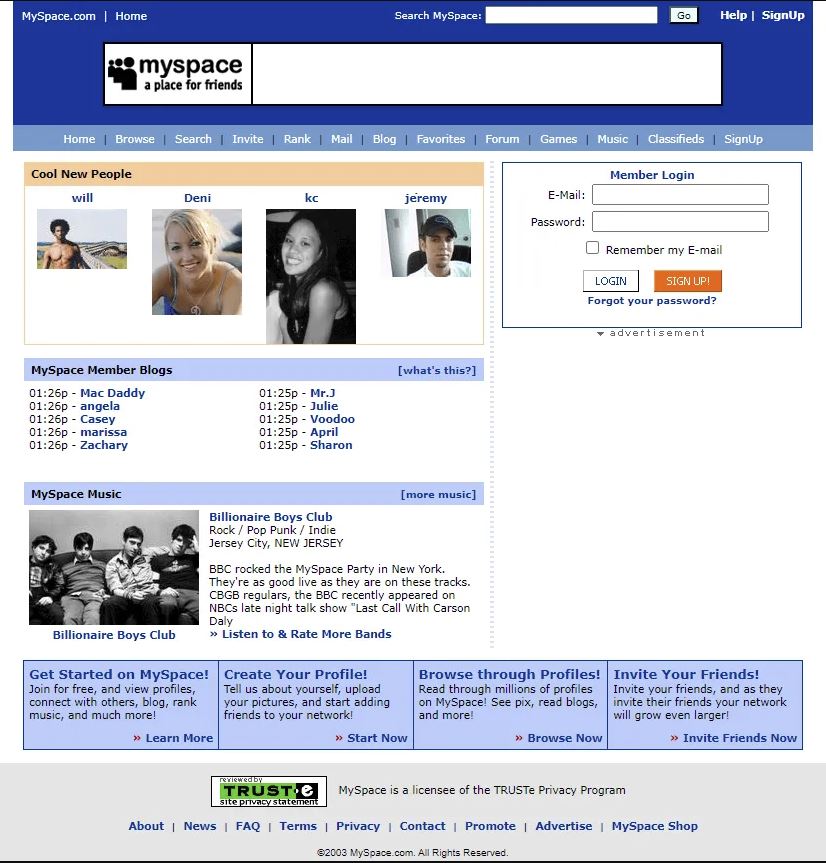
MySpace in 2003
It was pretty simple and nearly utilitarian. MySpace wasn’t a place with limitless user generated content to smoothly scroll through. You simply logged in, replied to messages from friends, checked their profiles if you were bored enough, then logged out and went about your business. All of this happened on a desktop computer that didn’t go with you everywhere.
From MySpace to Facebook
Eventually the fad of MySpace passed and Facebook rose in popularity. So, I did the fashionable thing and got on Facebook. It was 2008.
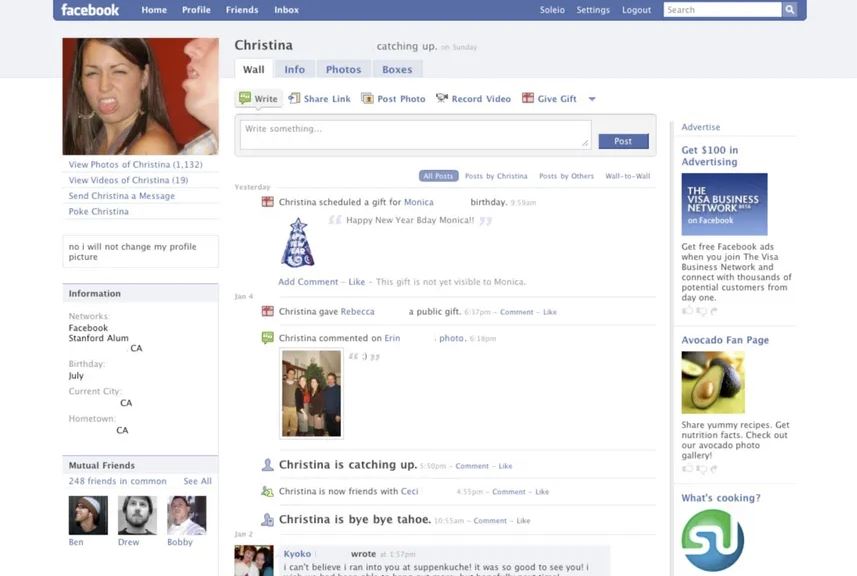
Facebook in 2008
It was sleeker than MySpace and got straight to the point: this is a place to "socialize" on the Internet. But, compared to what we have today, it was still basic in its functionality and user interface. It was non-algorithmic, there was no News Feed and, like MySpace, it was bland enough that it wasn't very dopaminergic and you'd only think to check it every now and then.
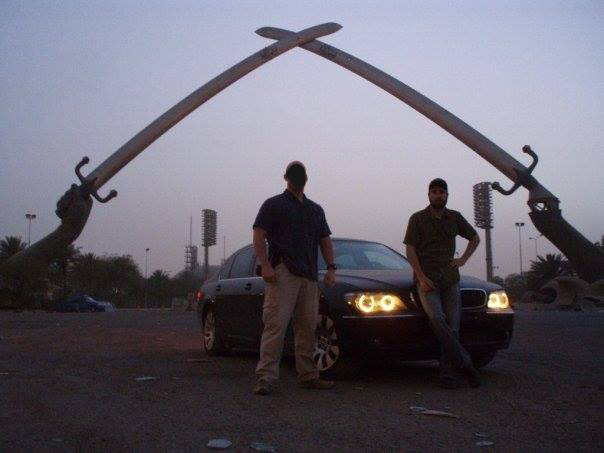
GWOT Trappin'
At the time, I was deploying to southwest Asia doing stuff for people and the phone I had was the classic Nokia 1100 cellphone that was pretty much indestructible and never ran out of battery life.
Man, do I miss that phone.
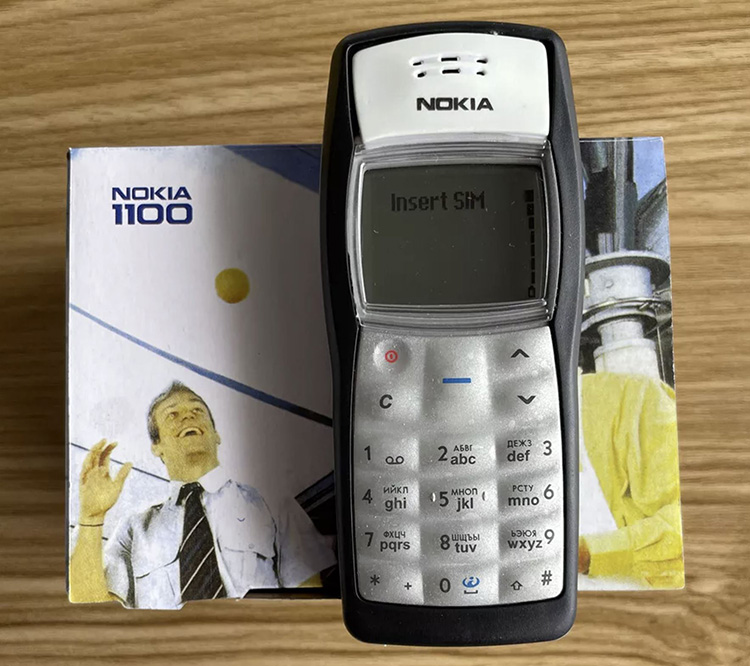
A simple communication tool and not a Boredom Killer
The iPhone had just come out and, to be honest, I thought it was stupid. To me, it was like putting an LCD screen on a can opener. It was cool, but unnecessary. Very much like a red Corvette: it's fun, appealing to the eye, but I don't need it to go places, have my needs met or live a happy life.
I did have a laptop and an Internet connection and used things like email, Skype and Facebook to stay in touch. Facebook was especially good because I was in a far-removed time zone from my friends and family back in Louisiana. I could catch up when it suited me.
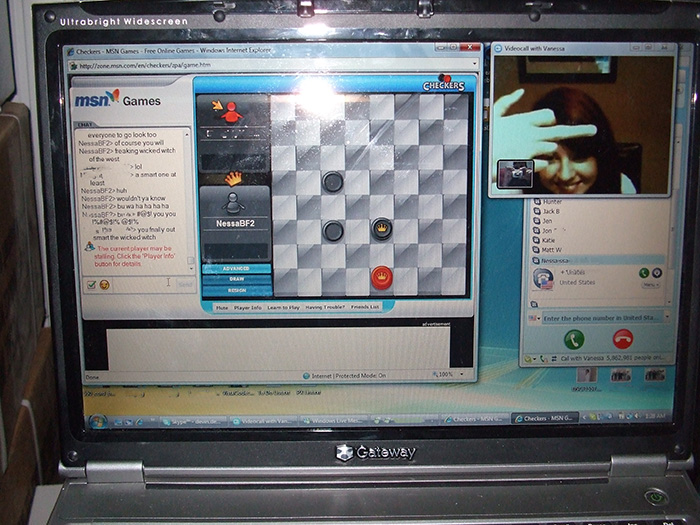
Keeping in touch while working abroad was made possible with the simplistic and non-algorithmic interface of talking and playing games over the Internet.
So, when I decided to get away from doing stuff for people and began chartering in 2011, it just made sense to start a Facebook page for Swamp Stallion Fishing Adventures and post content to it in order to advertise.

My fishing charter that I enjoyed from 2011 to 2014.
And that was a brilliant idea, because in 2011 hardly anyone in the realm of inshore fishing was on the Internet in a meaningful way.
Yes, there was TheHullTruth, TigerDroppings OB, RodnReel (RIP), 2Cool Fishing, Louisiana Sportsman, SaltyCajun and Segnette, but people from out of town looking to book trips had no idea those websites existed. Instead, they used things like TripAdvisor.
I was the first charter in my area to have a profile on there and boy did it kick ass! Below is just one review I had the presence of mind to save. The rest are lost to history.
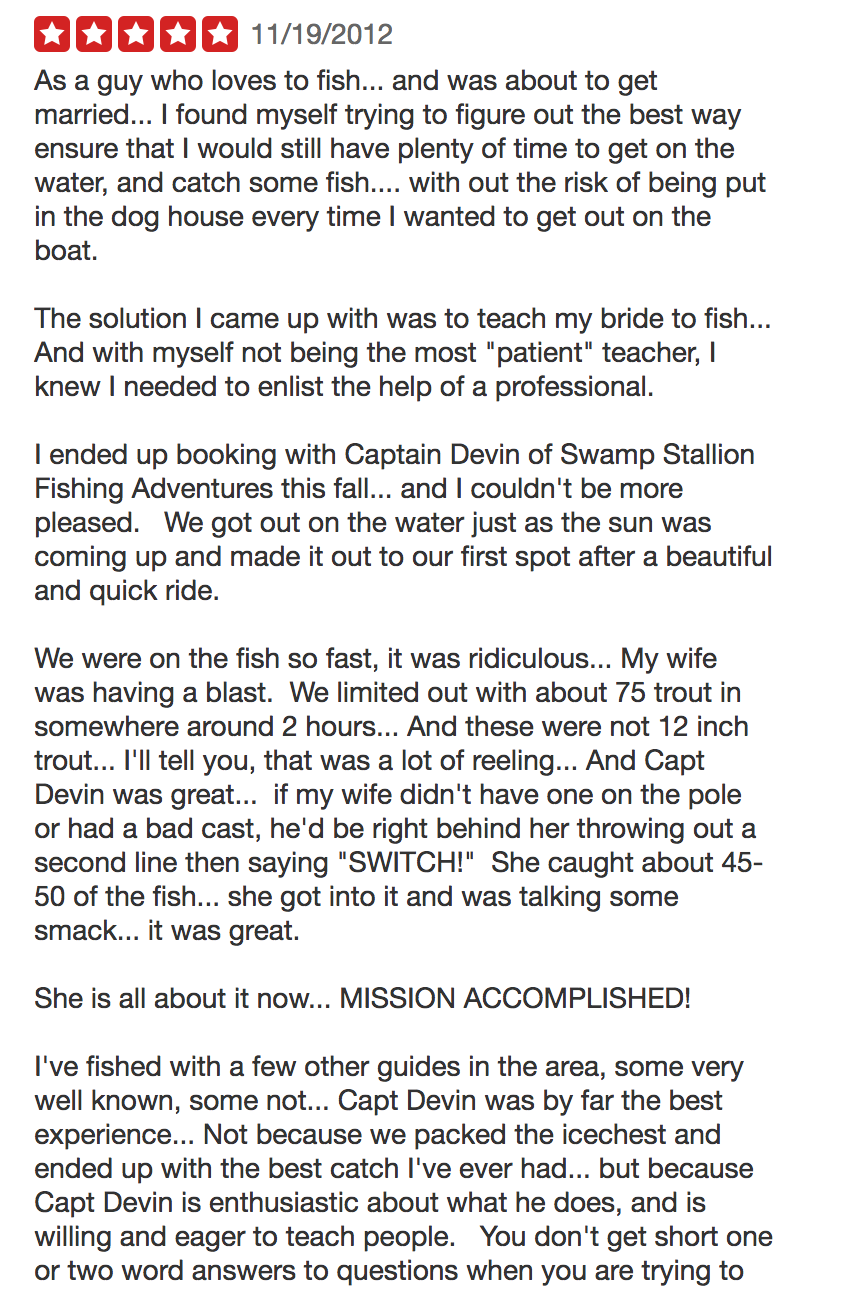
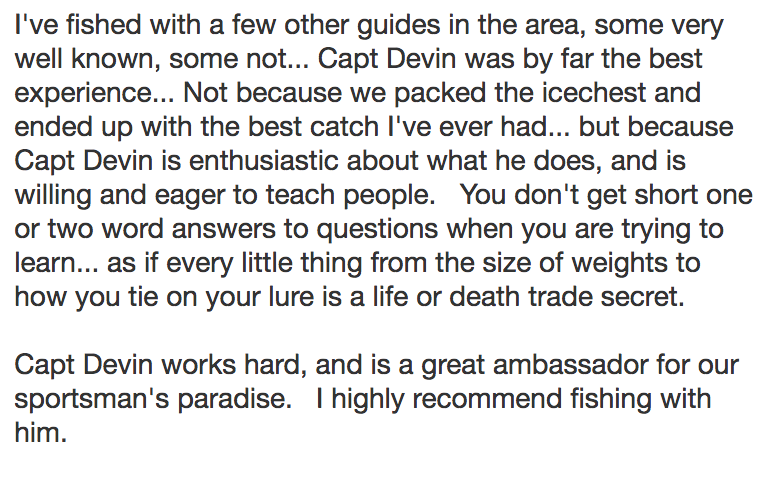
Then there was Facebook, which was good for building an audience to stay in touch with, very much like I did with friends and family while I was out of the country.
It was pretty simple: I posted good content, people liked it, they shared it with their friends, and my audience grew. Rinse and repeat to over 100,000 followers.
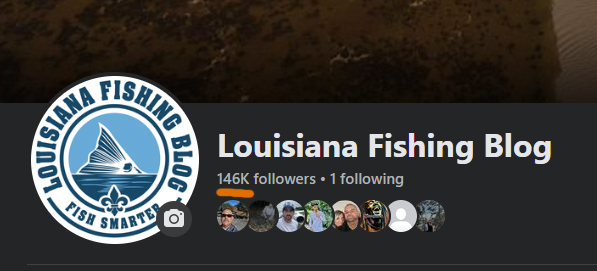
And, during that time, when I posted something — such as a fishing report or article from this website — virtually every one of my followers would see it. This was great, especially seeing that I was one of a handful of captains doing it.
The experience then was the opposite of what you see today: everyone and their mom with a “six-pack” OUPV license spamming the crap out of every Facebook group that won’t kick them out.
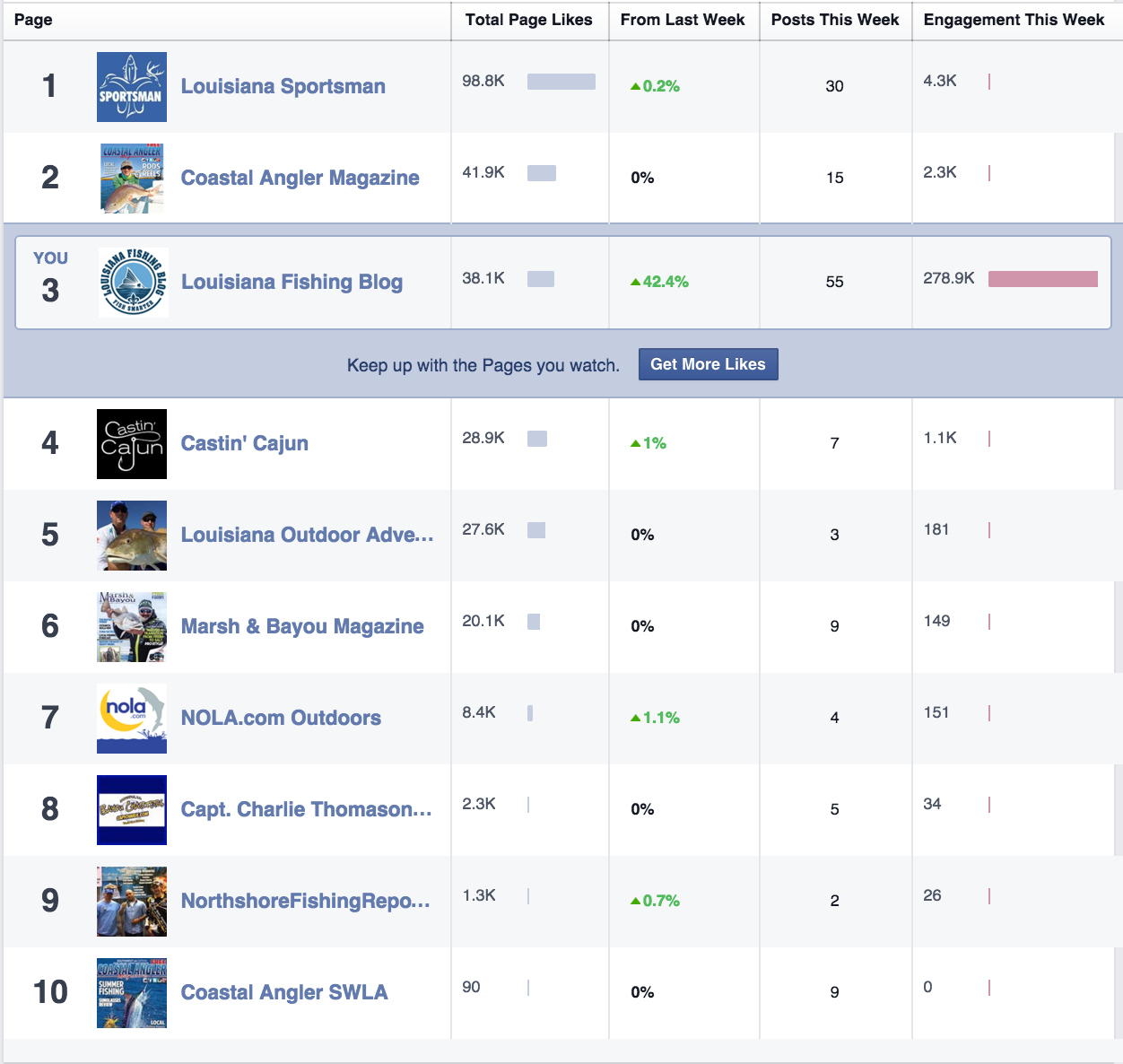
Louisiana Fishing Blog's FB page beating the snot out of everyone. Screenshot of stats from 2016.
No, it was the opposite: I got way more eyeballs for way less effort and got to keep them.
But this was not destined to last. Because social media eventually changed.
What Social Media Turned Into
The current form of social media was not the same as it was years ago.
Used to, you’d only see what your friends and the pages you followed posted, then that’s it. You went and did something else.
Then it turned into an infinite news feed displaying user generated content that is algorithmically selected based upon its ability to keep you on the platform. Whether you follow those pages or not, you are being shown their content.
This is a far cry from what social media used to be: a place where you saw content from the people and pages you cared about and deliberately selected to follow.
For example, a single piece of longer, but more thoughtful, content would get pushed aside for ten pieces that are shorter and shallower, but better at capturing your immediate attention.
Plainly put, my 5 minute video about getting good presentations on speckled trout has a snowball’s chance in Hell against softcore pornography and this week’s most viral doorbell camera video.
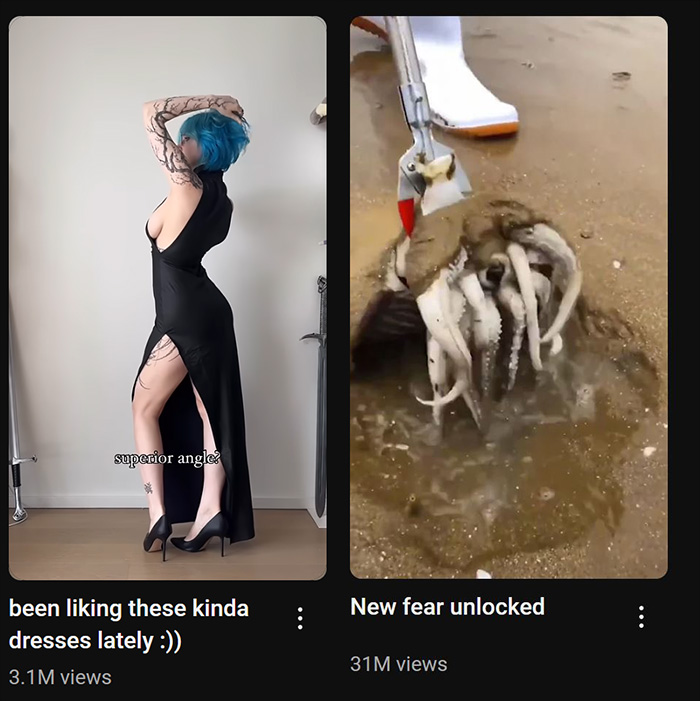
How in the hell am I supposed to compete with "brain stem" content like this in an algorithmic news feed? Why would I?
It’s really hard to cultivate a relationship with an audience when they’re being intentionally distracted at that level. This is great for Facebook (or YouTube, TikTok, etc.) but bad for me and Louisiana Fishing Blog (and, if you’re paying attention, for you).
Remember when, back in 2005, I’d check MySpace, reply to messages then log out and get on with my day?
Yeah, if everyone was that intentional with their use of Facebook, then Mark Zuckerberg would be seen jumping in front of the nearest bus as Meta’s stock took a steep dive.
If you’re not on Facebook, then they can’t serve you ads. If they can’t serve you ads, then they can’t make money. So their solution is to keep you on Facebook for as long as possible.
And what’s going to work better than wholesome content is content that goes straight for your brain stem.
How Social Media Affected My Personal Life (and probably yours, too)
I could really dive deep here, but I’ll just say that social media very obviously didn’t positively impact my well being or personal development.
Instead, I was clocking in to an Attention Factory every day and found myself becoming less observant, more compulsive, less organized and overall unhappier.
These effects were also visible in friends, local and abroad. Where we used to make a point to see each other in person, or talk on the phone, devolved into “look at what I found on Instagram today”.
No context, no “how are you?”, just a link to some random bullsh*t on social media. What the f#$k, dude?
Whenever we do get together, whatever we do is rarely "together". They're just on their phones, mentally somewhere else, jacked into Facebook like Neo does in the Matrix.
How Does This All Effect Fishing Trips?
So you can see how the change in social media can effect one’s personal and professional needs, but what about the actual fishing trips?
Well, it was about 2012 when people started using social media on their phones, and that’s when I noticed people being on their phones instead of paying attention to the fishing trip.
Now, this is something of a strange conundrum, because back then there was hardly a data signal out in the marsh. I remember crossing Lake Pontchartrain on the Twin Span and losing signal!
Breton Sound Marina in Hopedale didn’t even have a cell phone, they had an actual phone. Why? Well, because that’s what they always had and back then there was hardly a signal to be had anyway.
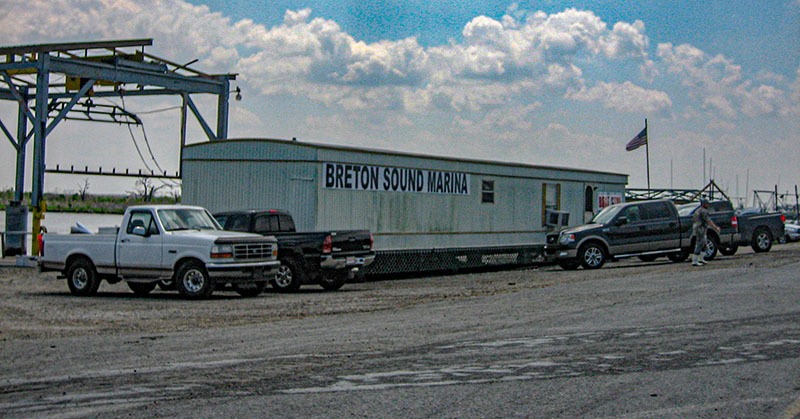
But, to my amazement, people I’d take fishing would be on their f$%&ing phones despite having paid for the trip in the first place!
Mind boggling.
This was bad for business, because if they weren’t fishing then they could not possibly catch anything, risking us to return to the dock with fewer fish or, Heaven forbid, empty ice chests.
And people would check their phones and get stressed out because they didn’t have a signal.
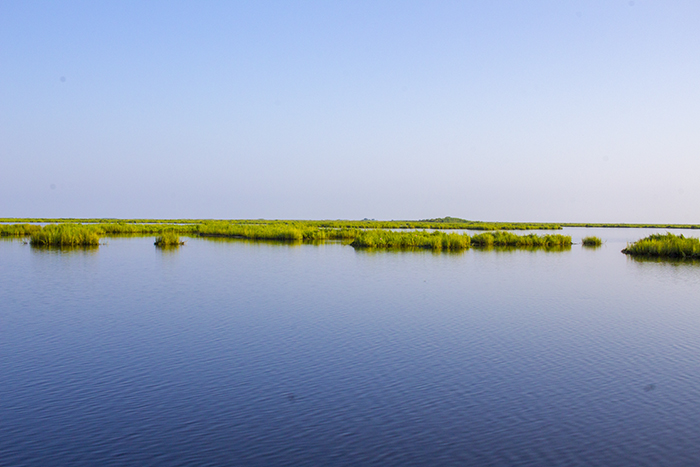
No cell towers out here!
I remember on one fishing trip, where we were way out in the marsh — and all we could see was marsh — this guy was asking me if we got cell signal out there. I held out my arm, gesturing in a wide circle at the 100% visible horizon and asked, “Do you see a cell tower out here?”
No sh*t, Sherlock! Now pick up your rod and cast at that fish!
Eventually, the years passed, people’s phone addiction grew and that horizon now has a bloody cell tower on it.
For other reasons, I stopped chartering and began my membership LAFB Elite, which grants access to fishing courses and its associated community.
During this time I also fell prey to the whimsies of Facebook, Instagram, TikTok, Snapchat and Twitter. I’d want to see how my content was performing, or what people were saying or — the very worst and dumbest thing you could do — argue on social media.
I found myself wanting to check my phone as I ran from fishing spot to fishing spot. Or something would happen on the fishing trip and I’d have to document it for social media.
And that effort always left me feeling disappointed and unfulfilled. Nor was this effort really moving the needle on membership sales for LAFB Elite, which was the whole point of using it in the first place.
If anyone did see my content, they didn’t stick around to see what else I have to offer them, because the big booty girl is already auto-playing for them, and their attention is instantly hijacked.
Lastly, I couldn’t enjoy my fishing trips like I had in the past because I felt I had to take a picture of everything, or shoot a reel, YouTube video, Instagram story or whatever.
The whole reason I got into inshore fishing in the first place is because it’s a full-sensory experience. It’s challenging. It’s a way to disconnect and get at odds with Nature. It’s something that’s far more rewarding than the contrived boundaries of something man-made like video games or bowling.
Social media was interrupting that. And for what? What’s the big payoff? What’s to be gained?
Comparison Is The Thief Of Joy
Another way that social media ruins fishing is the same way it ruins experiences for a lot of people: comparison.
When you go on social media you are only seeing the best foot put forward by whoever’s content you’re looking at. Honesty is not currency on such platforms.
For example, if you have a bad day of fishing (and we all eventually do) and you’re sour about it, then get on Instagram and see that someone whacked ‘em anyway…well that’s not exactly a warm hug from Mom.
But who cares what that other person caught? You still got to go fishing and the only person you should be comparing yourself against is yourself. The idea is to improve, not look for ways to be depressed. Bad fishing trips can actually be good, but social media doesn’t teach that.
And the part most people are missing when their joy is stolen is the fact that 99% of people only post about their fishing trip when things go well.
I cannot tell you how many times I’ve seen people on the water not post anything because they got their ass kicked by the fish. Because they don’t post, you never know.
Devin, aren’t you being a Sensitive Sally about all of this?
That’s a good question.
People should have thick skin and be resilient, especially if they’re going to be venturing into the Wild West known as The Internet. You shouldn’t get your feelings hurt so much (or at all) and should be disciplined enough to keep social media and phone usage from sweeping you away.
But I am disciplined and resilient. Not sure? Here’s what I do everyday when I wake up:
- Wakeup at sunrise
- 1 mile run (timed)
- 5 minute cold plunge
- light kettlebell workout
- 10 minute meditation
- 1 hour reading a book
- No food until 1pm!
Yeah, there’s your discipline, and that’s only the morning. Most people’s morning look something like:
- wakeup
- look at phone
- make coffee with sugar
- stuff face with carbs
- crashing back asleep by 11am
- avoid the gym
- doom scroll on phone, etc.
Now, when it comes to resiliency, being something of a public figure makes me open to criticism from every Tom, Dick and Harry with a smart phone and Internet connection.

You learn to let it slide like water off a duck’s back or pay the price of letting that affect your creativity, productivity and time with friends and family.
Also, Bulk Fuel ingrained resiliency into every bone in my body. When’s the last time you did a log run after not sleeping for a week?
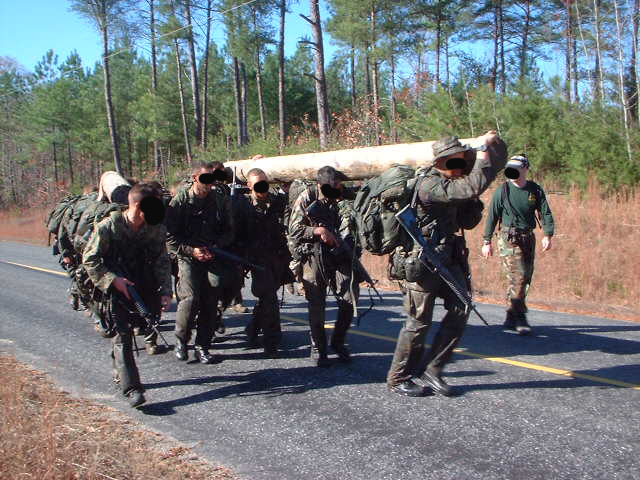
Lurkin_ never made it here
So then what’s the problem with social media and smart phones?
The problem isn’t what’s on your smart phone’s screen so much as it is the 1,000 people on the other side of it.
As you look at whatever social media app on your device, there are 1,000 of the world’s best software engineers, marketers, psychologists and even casino slot machine designers working together to command your attention.
If they think a raccoon stabbing toddlers with a spork will keep you on their platform for 30 seconds longer — so they can serve that Taco Bell ad — then you will see a toddler-stabbing, spork wielding, crazed raccoon just before you’re informed about the latest Chimichanga Super Deal.
Not because such a video is wholesome, important to see, informative or otherwise good for society, but because it works for their bottom line.
No matter how disciplined you are, the One Thousand are always there to gently nudge you in the direction they want.
A single comparison post most likely won’t suck the joy out of your day, but 100 of them over the space of a week will. Metaphorically speaking, it’s death not a by a single swing of the sword, but by a thousand tiny cuts.
This Was Not Accidental, The Social Media Giants Intentionally Make It To Be Addictive
Everything you see and experience on social apps is the product of rigorous testing by the 1,000 to determine the best way to keep you engaged.
This is a giant problem, because we all use these apps on good faith. We assume the people who make them have our best interest in heart and that they’re not being duplicitous.
We gave social media companies our good-faith in the same way we give it to the plexiglass window holding back the gorilla at the zoo.
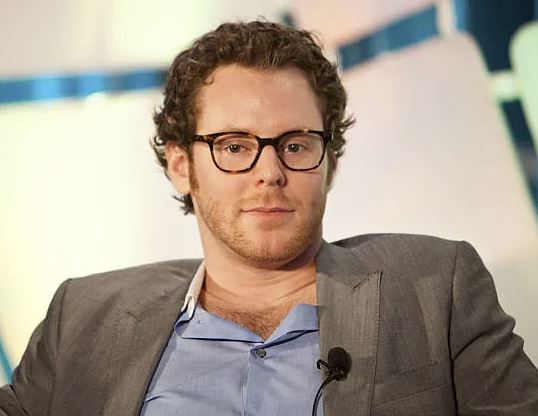
"
“It’s exactly the kind of thing that a hacker like myself would come up with, because you’re exploiting a vulnerability in human psychology…The inventors, creators — it’s me, it’s Mark [Zuckerberg], it’s Kevin Systrom on Instagram, it’s all of these people…understood this consciously. And we did it anyway.”
Sean Parker - former Facebook President
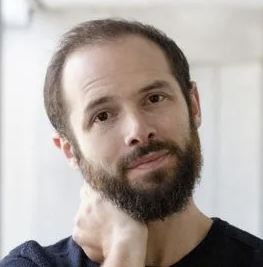
"
“It’s as if social media companies are taking behavioral cocaine and just sprinkling it all over your interface and that’s the thing that keeps you like coming back and back and back.”
Aza Raskin - inventor of the Infinite Scroll Feed
Getting Back To Fishing: Facebook Groups Have Ruined Fishing Reports
Used to, there was a lot more friction involved to get on the Internet and be part of a community. If you made the effort to be there, then you were more likely to make the effort to participate.
But today’s smart phone and ubiquitous Internet access allow a lot of lazy and helpless people to ask and never give. Here's a sample post history from one such troglodyte:
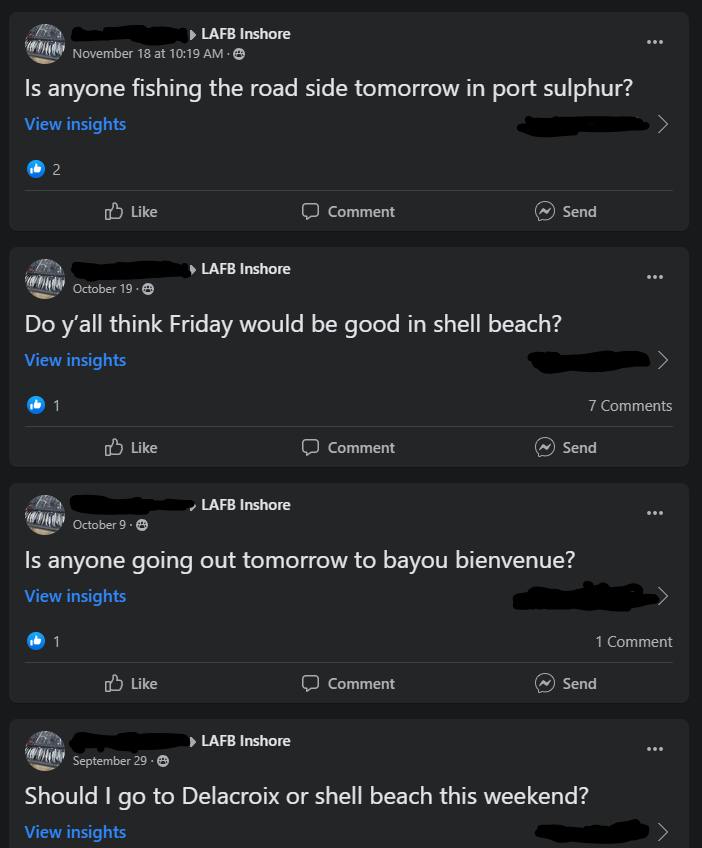
This creates a new norm that’s a giant turnoff to the people who want to actually participate, give and get something in return. After that, the organization of Facebook Groups and their search function absolutely sucks. Good luck finding fishing reports from the past.
You’d go to think a company that made $39 billion in profit in 2023 would have the know-how and resources to make something that’s not worse than the vBulletin boards of yesteryear.
It’s very clear that Facebook Groups are just another source of user-generated content served alongside the e-girls and raccoon to — you guessed it — serve ads on.
In short, Facebook doesn’t care about your online community. Facebook cares about its fiduciary responsibility to shareholders.
Social Media Companies Don’t Do The Hard Work, You Do
Platforms such as Facebook are like a restaurant that only has a building with chairs and tables inside of it. There’s no wait staff or food. Nothing but somewhere to sit and eat.
Now, imagine people who come in to make food, serve it to patrons, clean dishes and handle everything else. That’s the content creators.
The people scrolling content are the people coming in to eat.
But the people doing all the work don’t get paid. If you’ve ever waited tables, could you imagine working a six hour shift and not being compensated for it?
So why the hell do you do it on your phone?
Metaphorically speaking, Facebook makes money off the people who come in to eat the food made by the people they don’t have to pay, all because it’s inside their building.
Consider that maybe you should stop clocking-in to Mark Zuckerberg’s Attention Factory every day and do something else, somewhere else, that’s worth your effort. That's why I deleted my social media.
Social Media Ruins Creators Who Aren’t Careful
In this day and age anybody can become a content creator, it’s not particularly difficult. Now, to become a successful content creator, well, that’s a totally different thing that’s not so easy to accomplish.
How you define success depends on you, but if you wanted to make something that pays the bills, then you are going to have to be not only industrious but also creative.
It’s not so obvious, but social media is where creativity goes to die.
One reason as to why is content capture, or people copying something they see that worked somewhere else.
This is so pervasive that we now see people making their own version of a “sound” on social media, with TikToks and Instagram reels being a good example.
It’s the same thing, over and over. We see this happen with inshore fishing content, too. Someone makes a topwater video and then all of a sudden you have other YouTubers scrambling to film topwater action.
I have even seen it happen in the same fishing spot.
Imagine if Jimi Hendrix just copied Elvis. Or if Quentin Tarantino copied Steven Spielberg. Even if they were financially successful, they’d be morally and artistically bankrupt. Surely you understand my point.
So, if you want to be successful making original and creative content, then you cannot have your muse poisoned by the quagmire of unoriginal user-generated content on social media.
Looking at Analytics: Social Media Hurt User Engagement On My Website & YouTube Channels
I run analytics. I love them. Nothing is as good as hard, cut & dry numbers to indicate what’s really happening.
So I occasionally consult analytics to see where traffic to my website is coming from, and I found that people who find my content via search tended to stick around and more likely to develop a relationship with my brand.
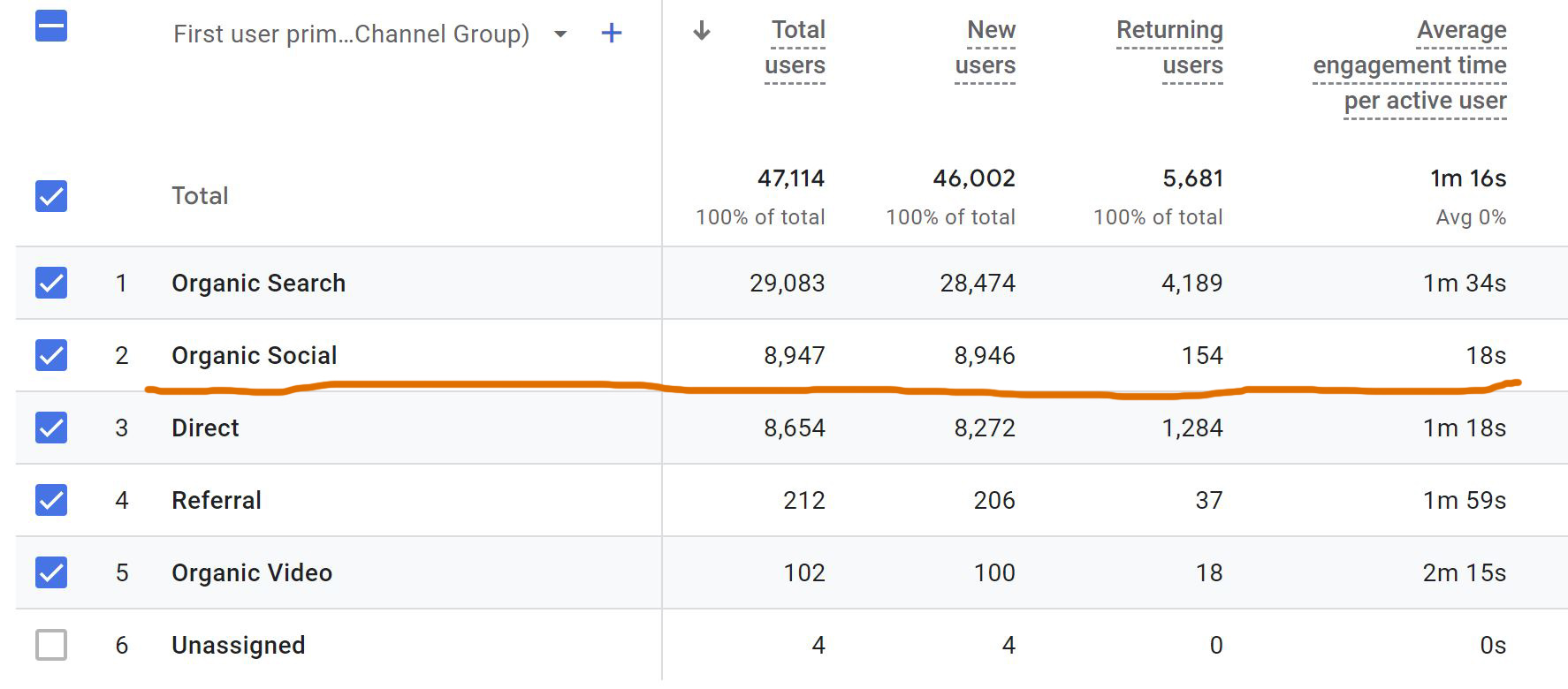
Traffic from social media underlined in orange. Stats for LAFB from June 11th to September 8th, 2024.
But I found that Facebook traffic would only spend something like 18 seconds on my site after clicking through. This is because their attention span is already primed to be short.
They’ve been watching the spork-wielding raccoon and twerking E-girls. Their brains are not ready to consume an in-depth fishing guide, so they go back to doom scrolling things that are far more dopaminergic.
I saw the same thing on my YouTube videos. The average view duration from social media was mere seconds, which arguably hurts the reach of my videos on YouTube. Simply put, posting my YouTube videos to Facebook hurt their performance!
Okay, so maybe I just need to get a lot of views on content. Well, I did that and it never amounted to anything.
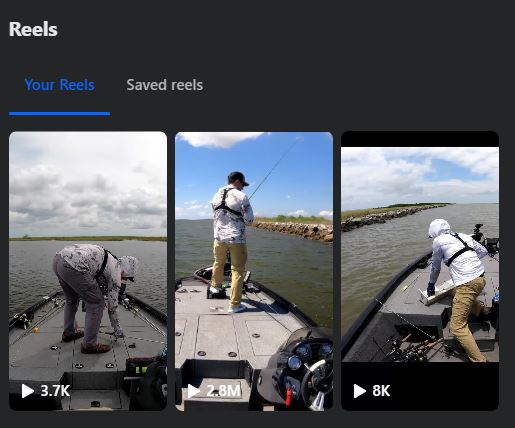
I understand that this is not a comprehensive look at analytics, but it's obvious that people’s attention spans have become smaller, and their interactions are now shallower.
On top of that, Facebook doesn’t want anyone going to YouTube or *gasp* some lowlife’s website, so they throttle the organic reach on such posts.
Here’s the Two Big Questions Everyone Is Scared To Answer:
So, if Facebook (or Instagram, TikTok, etc.) won’t let people see content I’ve created, and if the people on those platforms have attention that’s so short to the point it’s useless showing them the content anyway, then why would I use social media for my business?
If social media is distracting me from my friends, family and well being, then why would I use it for my personal life?
And This Leads Us To Why I Deleted My Social Media Permanently
Now it's obvious to you why social media had to get out of my life.
It’s not good for my personal life, it’s not good for my fishing trips and it’s not good for my business.
The evidence is just so clear when you take a step back, look at the numbers, and see these attention factories for what they are.
If Facebook had just remained the way it was without trying to copy TikTok or Snapchat, then it would be more wholesome and organic. Instead, it went from being a place we connect with friends and family to being a video entertainment platform. The same thing can be said for virtually every other social app.
It Wasn’t Easy Deleting at All, There Were Decisions To Make
There was a lot of “am I certain? Am I 100% sure this is the right decision?”.
I attempted experimenting and trying different things to make social media work for me, but at the end of the day it was clear that these companies would do anything and everything to grow their bottom line, to include dismissing creators who make all the content for them.
That and they’re constantly moving the goal post.
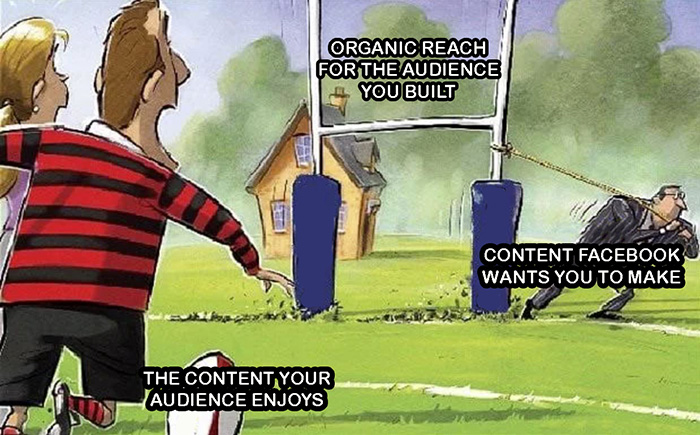
One year Instagram is trying to do what YouTube already does and the next year it’s copying TikTok with reels. Well, what if I only made long-form content for years? Was that effort for nothing?
And, of course, there’s the content capture I described earlier.
So, from a creative perspective, the only future was one where I had deleted my social media. The madness had to be gone from my life. But there was also this financial perspective:
Social Media Was Costing Me Time & Money
What if I, as something of a solopreneur, don’t have the time and resources to keep up with Meta’s board meetings and vision of the future?
What if I can’t hire a social media team to handle this whole other job for me?
I was using 3rd party auto-posters to organize, batch and schedule out various content types for various platforms. It’s not exactly cheap, though such services won’t break the bank, either.
But the worst cost was my time. I was constantly re-purposing content (that dreaded vertical video!), uploading it, scheduling it, checking comments, dealing with Meta’s glitches, and every month kicking on a new goal post.
We are talking thousands of dollars and hours a year, not to mention a shift in my personal and professional life.
That’s a lot of work and servitude just to get “likes”.
But I also had these ethical reasons…
The ethics of these social media platforms are questionable.
Maybe you live under a rock and haven’t seen everything these companies have gotten into trouble for, or maybe you know about the data leaks, stealing faceprints, getting indigenous people hooked on porn, the spread of TikTok Tourette’s, Instagram suicides, borderline personality disorder and more.
I don’t want to help them do that, and that’s one reason why I’ll just stick with my websites and YouTube from here on out.
This decision came at no small expense. It was easy to host LAFB Elite’s Community as a private Facebook Group, but moving it to LAFB Elite’s website and developing an app for it wasn’t free.
With that said, it’s a much better user experience! Myself and the members are all much happier with the Community in its present form.
Yes, I have a smaller audience on my website and YouTube channels than I did on Facebook, TikTok, Insta, Snap, etc. but that audience is more engaged and that higher engagement is, to me, more rewarding than entertaining someone for a fleeting ten seconds before they scroll on to the next piece of content.
It Was Clear That Meta Didn’t Want To Help Me (and didn’t care)
Nuking my social accounts became easier once I realized that I was always there for them and they were never there for me.
For years I tried to get Louisiana Fishing Blog and myself verified on Facebook, and it always got denied. I provided them with my ID, articles of incorporation, my domain, everything and they just couldn’t do it for me.
But they were more than happy to accept my free content and the tens of thousands of dollars I spent on advertising with them.
Our relationship was a one-way street and the decision to make was obvious.
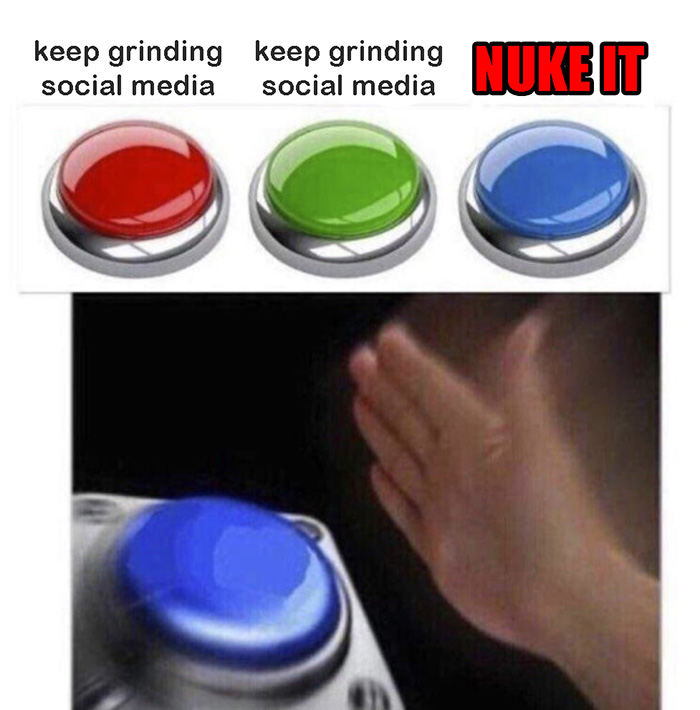
Here's the body count:
- personal Facebook profile maxed out at 5,000 "friends"
- Public Facebook Group with 20,000+ "members"
- Facebook Page with 146,000+
- Instagram with ~9,000
- TikTok with ~14,000
- Twitter didn't have much, something like 300
- Same for Snapchat
- whatever Pinterest had (I already forgot)
While these aren't the most badass numbers ever for a social media presence, they are certainly not trivial and few would make the decision to permanently delete them.
To be clear, these are not deactivated or simply deleted off my phone. They are gone forever.
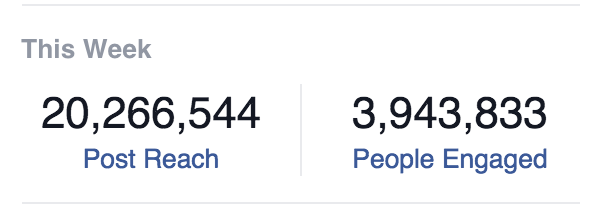
A great week of viral reach on Facebook in 2016. But it wasn't real, so it's better that it's gone.
What happened once I deleted my social media?
First off, no one noticed, and I found that hilarious. So much for the “brand” and “audience” I built on those platforms. It was never real to begin with.
Then my phone rang a lot less.
That’s because people weren’t reminded of me, like when they’d see my content in their feeds. That sounds kind of scary at first, but stop and think about it: if those people really are your friends, would they need Instagram to remind them? If so, how were people friends for the thousands of years before Instagram?
If people really cared about what you make, do they need SnapChat to remind them? If so, how did people ever fall in love with movies, books, and ideas before SnapChat?
Besides, the people who would hit me up after I made a social post were usually just pining for fishing intel and weren’t interested in having a meaningful friendship or championing my content.
My life is better without that shallowness. I’d rather have depth.
The friends I have today are fewer but deeper. They actually go fishing with me, or meet up for beers or talk on the phone or whatever activity that is deep.
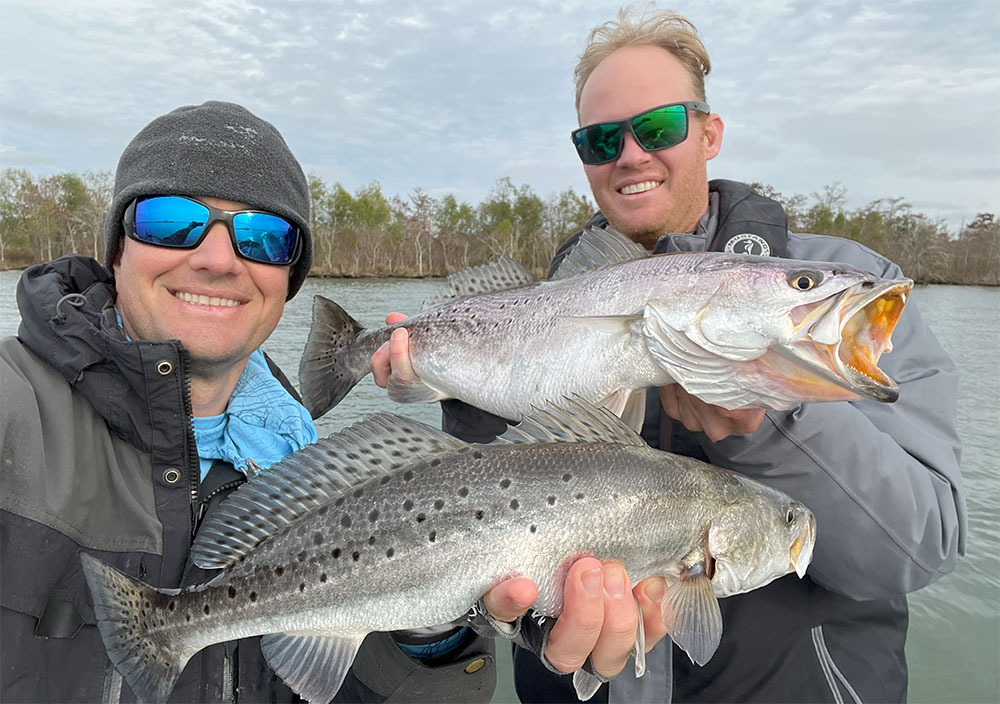
So, with social media out of the way, I was able to focus on that depth and create content that I love to make, that people love to have, and actually makes a positive difference.
No one, not once, not ever has anyone walked up to me in public and said “Hey, I really love that TikTok you made” but they have universally told me that they love my website, YouTube videos and courses inside LAFB Elite.
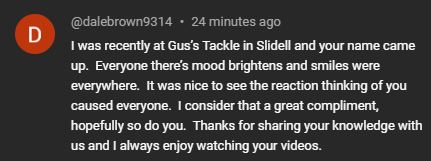
Thank you, kind sir.
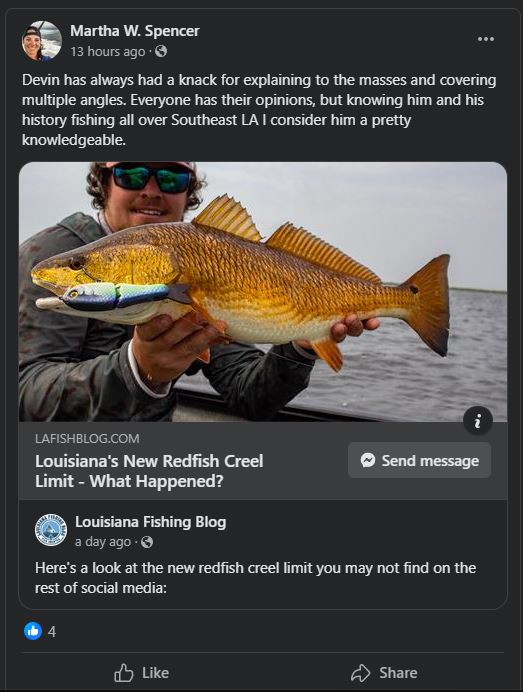
Thank you, Martha :D
It happens all the time. I can’t get a haircut, go grocery shopping or take my kids on a walk without someone telling me how much they love the non-social content. I am so thankful!
What is life like without social media?
More peace, more depth.
My thoughts are free to be their own. Ideas are original.
You have to understand that I went from 6-8 hours of screen time on an iPhone 12 Pro to having none of that on a flip phone.
Yes, I went hardcore, shoot-first, ask-questions-later, thermonuclear warfare and got a flip phone. You’re talking to the guy who runs and cold plunges after hopping out of bed. I mean business. No screwing around.
The compulsivity to look at my phone is gone (because it's a brick) and when I go fishing I can just go enjoy myself.
When I am with my friends and family, I am totally present with them. I have great conversations with strangers.
When it’s time to focus, I can focus an inch wide and a mile deep.
The result: I’ve created more badass content in the last two years when I began this journey than I have in the seven preceding that.
I re-wrote Inshore Fishing 101, which amounted to approximately 130,000 words and 12 hours of video. To put that into perspective, the first Harry Potter novel was slightly less than 100,000 words.
Speaking of books, I read a lot more. Anywhere from two to three books a month.
And I get bored. Which is great. Boredom is important. I could flesh that out here, but this post is already pretty long.
So, if one of you want me to elaborate on why boredom is important, then please ask in the comments (or check to see if someone already has). I’m more than happy to share my thoughts on that if you’re more than happy to have read this far.
The Critical Thing To Do If You Quit Social Media
I found that upon removing social media from my life that I suddenly had a lot of extra time.
You must fill that time with something high-quality, or you will find yourself pining for social media’s addictive allure.
Aside from fishing, I replaced social media with working out, reading books, watching movies, seeing friends in person, hiking, cooking food, and going on bicycle rides.
I also enjoy fixing up my house and gardening. It took some time, but I actually have a hummingbird feeder that’s regularly visited and it’s pretty neat watching them come and go while I write (like at this very moment).
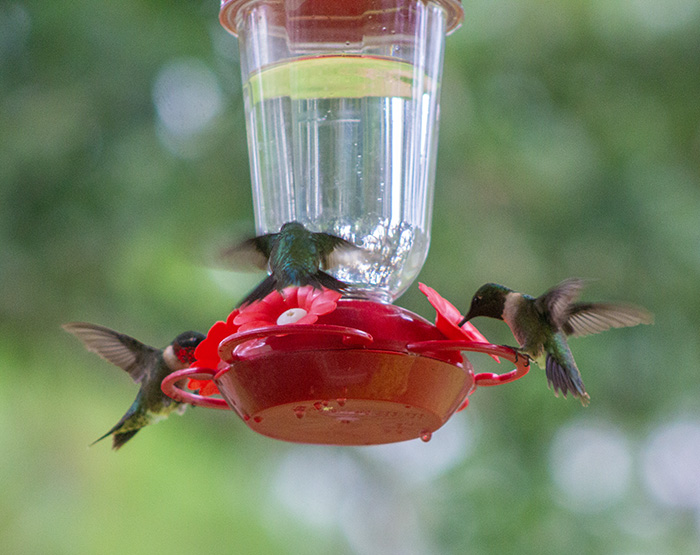
Cal Newport’s 30 day Digital De-Clutter, as described in his book Digital Minimalism, details this process pretty beautifully (quitting social media, not feeding hummingbirds).
Okay Devin, that’s great, but what about the rest of us?
So far I have taken a giant, steaming sh*t on social media and unceremoniously declared that it’s no good for me and my goals.
But what about you?
What if you’re a new content creator trying to get your start? What if you haven’t been posting fishing reports since 2009 and don’t have the early-adopter advantage like I did?
Let’s play a little Devil’s Advocate and, based upon my experiences with social media, answer the following question:
How could social media be useful to build something that people enjoy?
I think that social media like Facebook, Instagram, TikTok, and Snapchat could work as a brand awareness tool at the very top of a funnel that ultimately drains down to a lead or some kind of call-to-action that suits your goals.
You could even exist solely on social platforms and not ever bother with something like a website, email list or long-form content. I think you could make that happen. I'm doing that with Substack right now, though I have every intention of moving away from that platform once Reboot Reality gets some traction.
But be warned: you don’t own the social media account you’re posting content to or the “audience” that you build. They can take it away from you at any moment.
If you want to play that never-ending game, then knock yourself out, but you’re gonna work hard anyway, so you may as well put that work into your own platform, like I do with my websites, app and email list.
I’ve thought about it, and I don’t want to be 60 years old posting to TikTok. That just seems undignified and bad use of time. I’d rather my kids and grandkids see me reading a book or catching fish.
Where do you see yourself in the future?
At the very best, I think social media, in its current form, has become another tool in the toolbox, and not the best one at that.
How well it fits you depends on you and your needs.
If I had a big team and more money, I would probably keep social media and let my team re-purpose content for the various platforms, post to it and generally manage it, but I would never look at it.
Otherwise, it’s pretty much just me here at Louisiana Fishing Blog and my time and attention are better spent making long form content for people who see the value in it. Thank you.
Which leads us to this next question:
If social media is an endless grind, then what’s the best way to build an audience and be relevant?
Create something that’s too good to be ignored.
There you go. That’s your guiding light: Make something so good that people tell their friends.
If it really is good, people will gravitate to it, advertise it for you, post about it on social media for you and do the hard work of using it and spreading the word.
Yes, I think it’s possible to create something that’s not that great then market the hell out of it and make those sales happen. But as soon as you let off the gas, the hype will fade and so will the sales. Think McDonalds.
But, if it’s really good, it won’t need to do anything other than focus on that goodness and delivering it. Now think of a great steak restaurant local to where you live.
Are you still not sure? Here’s the proof:
Art Bell, Aliens, Tarantino & Hollywood
Consider Art Bell’s success: he created a world-famous late-night radio show from scratch in the 1990s. No social media.
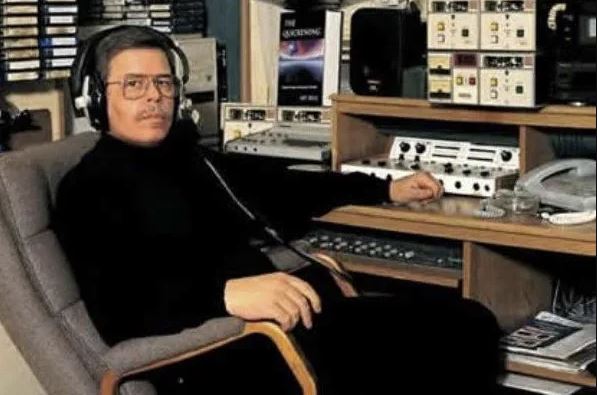
Now, hold on to your seat: at his peak, upwards of 15 million people tuned in each night to listen. This wasn’t “night” as in the evening, when normal people are awake. No, his show came on at midnight and ran to 4am, Central Standard Time.
Let me be clear: his show came on at the worst time of day for people to listen and millions tuned in anyway.
But there’s more: his show wasn’t about generic topics that everyone could relate to. No. His show was about the esoteric, ranging from quantum physics to exorcisms to time traveling Bigfoot hunters.
And people loved it.
They found out about it through their friends, and not through algorithmically curated content.
Our next example is pretty much any movie ever made by Quentin Tarantino.
When he made his movies, he wasn’t thinking of the thumbnail and its click-through rate. He wasn’t thinking how many views it would get, or “likes” or whatever dumbass currency these platforms make up to keep people working for free.
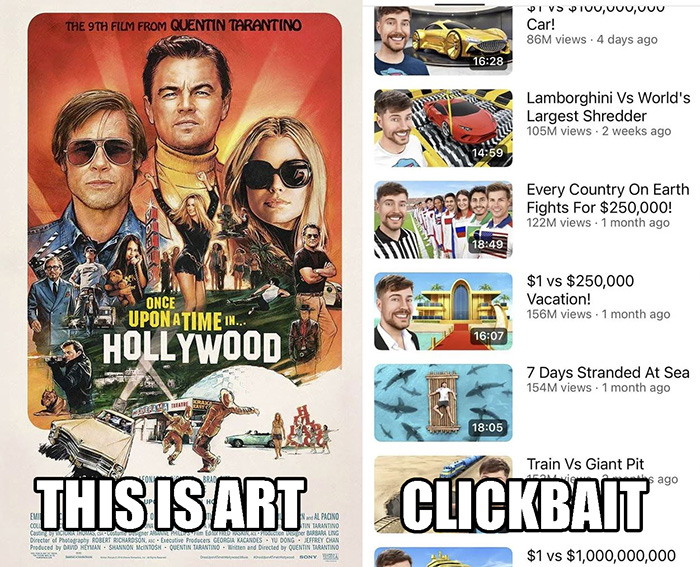
No. He just focused on making a badass movie. And people loved it.
I’ve taken that formula and applied it to my YouTube videos, this website and my courses and it has worked.
It’s not a hack. It’s not a shortcut. It’s just a method to apply hard work and genuine creativity that delivers on a consistent and growing return over time.
So if you’re also a content creator, then this is something you should consider. Do what’s best for you.
Over To You + More Resources
First of all, if you read through this behemoth blog post, then thank you. I appreciate anyone who can take the time to actually r-e-a-d and visit my website.
Secondly, if you have something to add, have a relatable experience or questions about this journey I went through, then please use the comments section below. I love it when people comment on my website!
Thirdly, if you found this essay interesting and want to read more like it, then please consider subscribing to Reboot Reality. There I talk about how to improve our relationship with technology through intentionality.
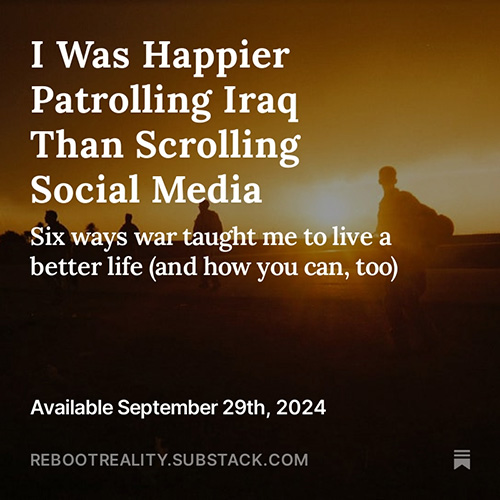
Be sure to subscribe so you can see when this one comes out.
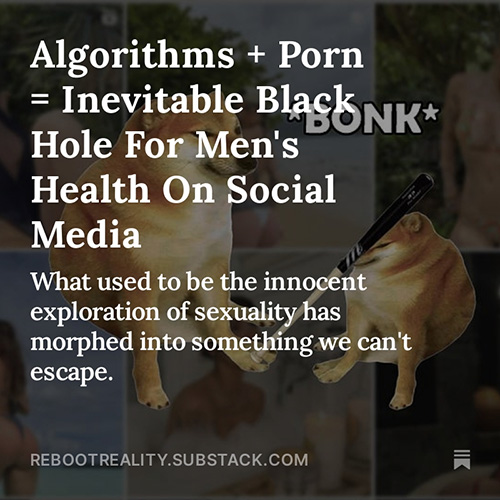
This essay is already live. You can enjoy it now :D
Fourthly, if you want to join an online community of serious inshore anglers who enjoy helping each other catch fish, then please consider joining LAFB Elite. No social media required!
Last, but not least, if you’d like to know some of the reading material I got these ideas from, or books I found that closely paralleled my own experience with social media (and probably yours as well), then please consider reading these:
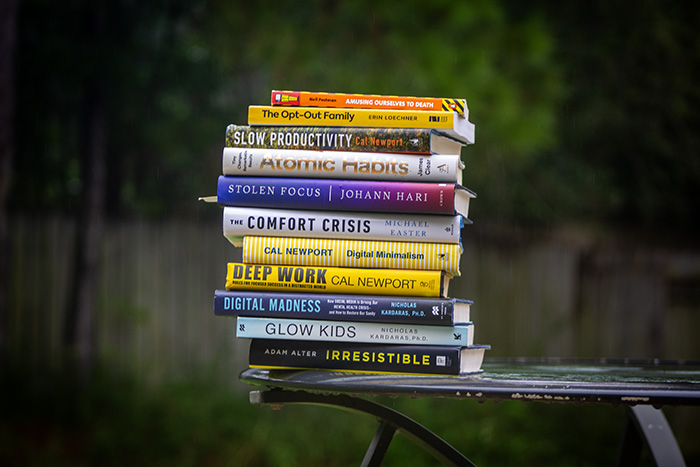
- Digital Minimalism by Cal Newport
- Deep Work by Cal Newport
- Slow Productivity by Cal Newport
- Glow Kids by David Kardaras
- Digital Madness by David Kardaras
- Amusing Ourselves to Death by Neil Postman
- Brave New World by Aldous Huxley
- 10 Arguments For Deleting Your Social Media Accounts Right Now by Jaron Lanier
- Stolen Focus by Johann Hari
- Irresistible by Adam Alter
- Atomic Habits by James Clear
- Comfort Crisis by Michael Easter
- Zucked by Roger McNamee
- The Opt-Out Family by Erin Loechner
Please note, the above are affiliate links, for which I receive a small commission at no extra cost to you.
Or, if you don’t think you will keep these books for future reference, then you really ought to visit the library and check them out for free.
And that’s a wrap! I hope that sharing my journey with social media helps you to whatever end is best for you.
Tight lines, and thank you for reading.

Thank you for taking time to visit this blog post and taking time to comment. I know it’s a long read and out-of-the-way from what people are used to on social media.
Good thoughts. Good journey.
Thank you so much, Keith! I appreciate your patronage!
Hey Devin, great article and I have thoroughly enjoyed being part of the LAFB community. I’ve learned a great deal and a different outlook on fishing as a whole. Keep up the great work!
Thank you so much Jerome. Hope you made out alright with the hurricane!
Devin ive always enjoyed your videos, the teaching you give us and like hearing your thoughts. I was bummed when you disappeared for awhile but glad you are back, i will gladly watch and read whatever you put out. Im glad you are able to do what works for you and wish you success!
Thank you, Jon! I appreciate you taking time to comment. I look forward to writing more. Well, that’s what I do most of the time now, even with YouTube videos. They’re all written out. I have a few more fishing guides (not about social media) scheduled out. Thank you for visiting!
I appreciate your total engagement in your thoughts! Like what you said, if something does not make you comfortable then why the hassle, more or less. I’ve enjoyed your articles for a long time. Enjoy your time and life! Keep a tight line!!!!!